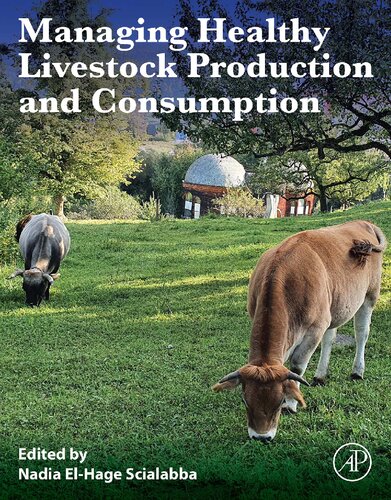

Most ebook files are in PDF format, so you can easily read them using various software such as Foxit Reader or directly on the Google Chrome browser.
Some ebook files are released by publishers in other formats such as .awz, .mobi, .epub, .fb2, etc. You may need to install specific software to read these formats on mobile/PC, such as Calibre.
Please read the tutorial at this link. https://ebooknice.com/page/post?id=faq
We offer FREE conversion to the popular formats you request; however, this may take some time. Therefore, right after payment, please email us, and we will try to provide the service as quickly as possible.
For some exceptional file formats or broken links (if any), please refrain from opening any disputes. Instead, email us first, and we will try to assist within a maximum of 6 hours.
EbookNice Team

Status:
Available4.4
25 reviewsManaging Healthy Livestock Production and Consumption is a highly interdisciplinary resource based on scientific and empirical evidence. It is illustrated with best practices of low-input livestock systems from different continents and offers predictive modelling alternatives for a more resilient future. By addressing gaps of knowledge and presenting scientific perspective studies of livestock’s impact on the environment and the global food supply up to 2050, this book is useful for those advocating for sustainable food systems. Existing evidence of the effects of livestock production on food quality and nutrition is reviewed.
Livestock production and consumption is a highly diverse topic where current publications only include/focus a single aspect of the issues, for example, greenhouse gas emissions or health impacts, leading to unilateral decisions such as refraining from meat consumption. However, animals are necessary to soil fertility and ecosystems balance and a more realistic resource is necessary for researchers, scientists, and policy makers. This book clarifies perceptions by presenting sound scientific evidence across livestock landscapes for the scientific community to better appreciate the ecological web of life and the social web of community related to livestock production.
An edited work written by globally diverse scientists and practitioners, including field workers, technicians, and policy makers, this is a valuable resource for researchers, teachers, and development agents working in the area of sustainable livestock production and consumption of animal source foods. National, international organizations, policy makers, and donors interested in sustainable development of the livestock sector will also find the information here practical and applicable.